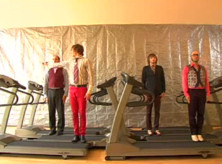I've seen much talk regarding Microsoft's overhaul of the
Office UI. Many consider it a risky move, and I'm sure Microsoft spent immense resources on research and development. Here's my stab at succinctly characterizing the risks:

One of the problems with today's software is an ever-creeping learning curve. Many of us have been with our favorite applications for years. The annual batches of features have appeared incrementally to us, but for many of today's beginners, starting from scratch is like drinking from a firehose.
On the balance sheet of human effort, years of slowly accumulated computing experience now translate into a substantial time investment in learning various applications. (And to the chagrin and shock of many techies, there actually are people who don't enjoy learning to use software.) These are sunk costs, and for obvious reasons many users aren't particularly enamored with the thought of incurring them again.
The economic term for the phenomenon is
path dependence. It occurs when there are prohibitively high costs associated with switching to a better alternative. Some of the most frequently noted examples include the QWERTY keyboard (everyone knows
Dvorak is the way to go) and VHS (which famously defeated the superior Betamax).
As a creator of software, I've spent a a fair amount of time mulling this over. There's a fine balancing act to maintain. You want to create the best application you possibly can, but users are generally resistant to change due to the costs associated with relearning. The more changes you make to attract new customers, the more you tend to irritate your existing customers.
At this point, I'm most inclined to favor a generational approach to software. Following such an approach Microsoft would maintain, say, both
Office Classic and
Office: The Next Generation. Inured, recalcitrant users would be free to continue on with the interface they know while OTNG would be given deep educational discounts to get the youngins hooked on a newer, better and radically changed next generation product. The switch would be transitional.














